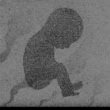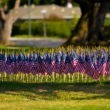An editorial-page cartoon by Nick Anderson in the Louisville Courier Journal showed a bearded, smiling Saddam Hussein peering through the bars of a prison cell. He was giving a thumbs-up and a “nice work, guys!” comment to two American soldiers as they wired a hooded Iraqi prisoner for electric shocks. Another cartoon, in the Hackensack, New Jersey,Record, showed U.S. soldiers raising an “Under New Management” sign over the locked door of a building marked “Saddam’s Torture Chamber.”
Even though the right-wing broadcaster Rush Limbaugh has called the torture and humiliation of Iraqi prisoners by U.S. Army reservists at Abu Ghraib prison in Baghdad nothing more than “a fraternity prank,” the Army itself has started treating the issue with seriousness.
The work of Major General Antonio Taguba, the Army officer assigned to investigate the conduct of the soldiers, is a case in point. After unpublished alerts from the International Committee of the Red Cross (ICRC) resulted in little action, Taguba was finally enlisted to write a report. His lengthy paper blasted “numerous incidents of sadistic, blatant and wanton criminal abuses” that were part of “systemic and illegal abuse” inflicted on the detainees by American troops.
More than a year ago the Red Cross became very concerned and began filing complaints about the treatment of prisoners in American custody, both in Afghanistan and Iraq. Under ICRC policy, the reports were not made public, but last month (May 10) the Wall Street Journal wrote about one of them, prepared last October. And we know that a U.S. soldier came forward in January, reporting abuse to higher command. It seems clear that military commanders took months to begin their own investigations and then did little to end the abuses.
From the Pentagon there now comes a “we didn’t know” explanation for its inaction. But for Secretary of Defense Donald Rumsfeld and his top command the unanswered question is less whether they were involved than, why not.
THE TOP COMMAND—In one of several damning articles about Iraqi prisoner abuse for theNew Yorker magazine, the Pulitzer Prize-winning reporter Seymour Hersh wrote (May 17 issue):
“The roots of the Abu Ghraib prison scandal lie not in the criminal inclinations of a few Army reservists but in the decision, approved last year by Secretary of Defense Donald Rumsfeld, to expand a highly secret operation, which had been focused on the hunt for al Qaeda, to the interrogation of prisoners in Iraq. Rumsfeld’s decision embittered the American intelligence community, damaged the effectiveness of elite combat units, and hurt America’s prospects in the war on terror.”
At the Pentagon Rumsfeld’s spokesmen furiously denied it all—probably a sign that it is all true.
Hersh found that Rumsfeld’s strategy in seizing control of intelligence operations in Iraq from the C.I.A. for his own “special access program,” labeled SAP, “encouraged physical coercion and sexual humiliation of Iraqi prisoners in an effort to generate more intelligence about the growing insurgency in Iraq.”
Hersh has praise for Maj. General Taguba. Another general had examined the situation earlier and said there was nothing wrong; things were OK by him.
General Taguba would also win a Pulitzer Prize if he were an investigative reporter. His 53-page report found that “the intentional abuse” inflicted by American guards included “punching, slapping and kicking detainees, and jumping on their naked feet,” “forcibly arranging detainees in various sexually explicit positions,” forcing groups of male detainees to masturbate while being photographed and videotaped,” “keeping them naked for several days”—and worst, placing a detainee under a head-covering bag and “attaching wires to his fingers, toes and penis” for threatened electric shock.
General Taguba reported that the Army reservists who did this had received no training in prison detention or on the protective terms of the Geneva Conventions, the series of post-World War II, post-Nazi Holocaust international meetings that set protective standards for prisoners of war.
Among other things he discovered—and reported—were the thousands of digital camera photos taken by American prison guards of “naked male and female detainees,” some of them in sexually explicit positions, and the shots of men forced to masturbate on camera, all scenes regarded in the Arab world as particularly demeaning. Or so the thinking went, although, seriously, anyone would be demeaned by being so treated.
Digital cameras, and now camera cell phones, which don’t even need a hookup with a computer to transmit pictures, have radically changed evidentiary discovery. Digital camera images, saved in an in-camera computer chip, can be plugged in and viewed on a TV screen, sent to a paper printer for a color printout, and—communicating most diversely—sent worldwide by e-mail on the Internet.
Sent by whom, and to whom—and why?—isn’t clear yet. But one of the busiest participants in the scandal, Army Reserve Pfc. Lynndie England, said in a sworn statement to investigators before her court-martial that she thought what the troops were doing “looked funny, so pictures were taken.” She has also said that she was told the photos were needed to interrogate prisoners.
By now we have all seen what “looked funny”—among them the picture of a pile of Iraqi detainees stacked naked on the floor next to Pfc. England, standing there with a smiling thumbs-up gesture. She was also photographed holding a dog leash attached to a prostrate, naked prisoner.
Before the sensational pictures of the Iraqi detainees appeared, there was that stunningly exclusive—because scenes of G.I. casualties are censored by the Bush administration—e-mailed photo of flag-draped caskets of American troops killed in Iraq being flown home. The Internet has been busy. General Taguba’s no-pulled-punches report was an officially unpublished Army document, leaked to Seymour Hersh, but it also went public with an unauthorized international airing on the web.
Three months ago the Bush White House announced that it would not need to ask Congress for more money for military operations in Iraq until next year. Even before the prisoner abuse crisis, due to what he called other “recent developments” in Iraq, the president had to ask Congress for a quick “contingency fund” of $25 billion. He may get it, but not without more congressional rhetoric like this from Senator Robert Byrd (D-WV): “This is $25 billion worth of proof that the Bush White House has no plan for Iraq.”
HIDDEN MAYHEM—The executive director of Amnesty International USA, which as long ago as last July reported allegations by freed Iraqi prisoners of torture by Americans, now predicts that “this [discovery] has broad ramifications for the United States’ reputation, not just in the conduct of the Iraq war, but in all our future foreign policy and future use of the military.”
Neither Amnesty International nor Human Rights Watch has been allowed to enter and inspect Iraqi prisons under American control. Observers of the International Committee of the Red Cross have been allowed some prison visits and have sent reports to American military commanders. ICRC made no public disclosures.
Pointing out that “torture flourishes in the dark,” Human Rights Watch has renewed its request for access to all lockups where American military and intelligence agencies are holding Iraqi detainees. In a letter to Secretary Rumsfeld, Kenneth Roth, the executive director of Human Rights Watch, said that “the United States has lost the ability to ensure that its own investigations will be considered impartial and independent. Independent monitoring organizations report their findings publicly, and that’s very important in this climate.”
We don’t remember seeing any news of it, but it turns out that after human rights groups pressed the Pentagon and the White House to issue a statement renouncing cruel and unusual punishment the White House issued a presidential statement, on June 26, 2003, condemning torture and promising to prevent it. It also turns out that the Pentagon later approved prisoner interrogation procedures that contradicted the Bush statement.
Of the subsequent horrific disclosures, Rumsfeld said that “it breaks our hearts that, in fact, someone did not say: ‘Wait. Look, this is terrible. We need to do something.” Why not? He didn’t say.
In mid-May, Rumsfeld took a surprise trip to Iraq to try boosting troop morale—and the troops gave him loud cheers. He made a quick visit to the Abu Ghraib prison—pronounced “Abu Grabe” by most Americans. The Rumsfeld trip to appear before whooping troops was his try at what Mark Shields on PBS called “innocence by association.”
It didn’t work. The headline on a seven-page Newsweek takeout on the Pentagon’s inaction on prisoner abuse was: “No Good Defense.” The cover page headline of The Economist says “Resign, Rumsfeld,” and inside the magazine adds that “If he won’t resign, Mr. Bush should fire him.”
The news magazines didn’t let up. In a parody of the pro-war neocons’ prediction that the war in Iraq would be a “cakewalk” based on the enemy’s “shock and awe” at overwhelming U.S. force, U.S. News and World Report ran a cover picture of an arm-bound Iraqi prisoner whose head was hooded by a pair of women’s underpants. The cover’s huge headline was: “Shocking and Awful.”
Even the usually feverishly pro-Bush right-wing magazine The Weekly Standard said, “The Bush administration seems not to recognize how widespread, and how bipartisan, is the view that Iraq is already lost or on the verge of being lost. The administration therefore may not appreciate how close the whole nation is to tipping decisively against the war.”
Rumsfeld has called the disclosures of torture by “a few who have betrayed our values” “stunning” and “a body blow.” But President Bush says that Rumsfeld has done a “superb job.” And the Wall Street Journal predicts that Bush will keep Rumsfeld—”for now”—because outing him “would be an admission of weakness on national security, the centerpiece of the president’s re-election campaign.”
A poll of 3,444 Iraqis taken in late March by an Arabic research center for the Gallup organization, USA Today and CNN found that 57 percent wanted the U.S.-led occupation to end quickly. As the president put it during his bumbling April 13 news conference: “They’re not happy they’re occupied. I wouldn’t be happy if I were occupied, either.” And that was before the disclosures of prisoner abuse by Americans.
Recent polls here at home show that others who are “not happy” include the 51 percent in a Gallup Poll who said they “disapprove” of the way Bush is handling the Iraq war, and the 58 percent who agreed with them in a Pew Research Center poll. Gallup listed 62 percent as “dissatisfied” with the way things are going at home.
By mid-May, 76 percent of Americans polled by Pew said they had seen pictures of the mistreatment of Iraqi prisoners, and for the first time a majority, 56 percent, said the overall military effort in Iraq is going badly. According to a CNN/Time magazine poll, the impact on the Bush-Kerry race—even with Ralph Nader factored in—was 49 percent for Kerry, 44 percent for Bush, and 6 percent for Nader.
Based on all that, David Brooks, a conservative columnist at the New York Times, has said that “if the election were held today Bush would lose.”
Top Bush administration staffers in and out of the Pentagon have said that they knew nothing of the array of prisoner abuse photos, now reported to number in the thousands, until 60 Minutes II aired some of them on April 28.
One top official who did know about them, General Richard Myers, the chairman of the Joint Chiefs of Staff and a Rumsfeld cheerleader, had privately persuaded people at CBS to delay the broadcast for two weeks to avoid stirring up anti-American violence in Iraq.
But in fact, the photos were about to pop up elsewhere anyway. After the prisoner pictures began to be published, there was outrage throughout the Muslim world. Then, a video began to circulate on the Internet showing the vengeful, on-screen, bare-knife beheading of Nicholas Berg, a 26-year-old American freelance contract worker captured on an Iraqi street by Islamic militants. They claimed that they killed Berg in revenge for the Iraqi prisoner abuses at the Abu Ghraib prison. Berg, a Jew, was decapitated by a masked man later identified as Abu Musah Zarqawi, a Jordanian terrorist, surrounded by four other masked men and with an on-screen statement in Arabic promising that “you will not receive anything from us but coffins after coffins . . . slaughtered in this way.”
RIGHT OR WRONG?—Gerald Seib, the Washington bureau chief of the Wall Street Journal, put it eloquently in a May 10 column asking, “Has something happened along the way to the American soul?”
“The war against terrorism started with a firm national conviction that America was in the right,” he wrote. “The war against Iraq began with a firm conviction that the U.S. could change the Middle East. The [prisoner abuse] scandal has sown new doubts about premises. Above all, the U.S. has come face to face with the possibility that it isn’t changing the Middle East, but rather is being changed by the Middle East—and not for the better.”
He had more. “Is Iraq affecting America as much as America is affecting Iraq?” he wondered. There is little sign that President Bush’s answer—that America has the power to change the world for the better, starting in Iraq—will be altered. His challenge of convincing fellow Americans has become tougher.”
In the New York Times, its retired columnist Anthony Lewis said the Bush administration’s excuse that the torturing of Iraqi prisoners by enlisted troops was the sin of “a few bad apples” reflected the “low regard for the law” that has marked every chapter of its war on terror. Another Times columnist, Maureen Dowd, wrote that “the Bush hawks, so fixated on making the Middle East look more like America, have ended up making America look un-American.”
The Washington Post said it has found a growing number of members of Congress who conclude that more senior military officers were involved in the decisions to inflict prisoner abuse than just the seven enlisted men and women now charged with the wrongdoing. The court-martial trial of one of them began as we went to press.
The commentary in the European press on this whole sorry episode was razor-sharp. We found a wrap-up that included charges that “Bush has robbed America of its values,” that “the law of the jungle will become even stronger, and chaos will reign,” and that it is the U.S. that needs “a regime change—replacing Bush in the next election.”
One of our readers, who also reads the London Sunday Times, sent us its cartoon showing a towering, teetering statue of Bush being pulled down, à la Saddam Hussein, with Condoleezza Rice losing a mighty struggle to hold him up.






0 Comments